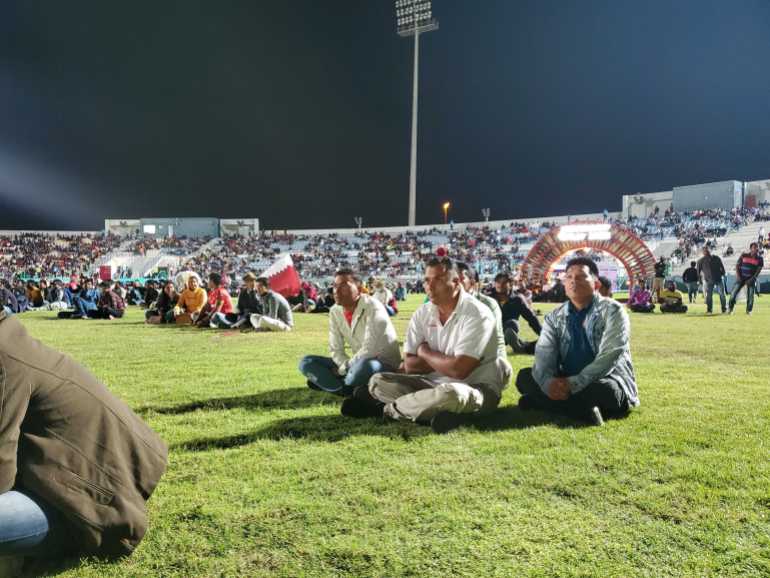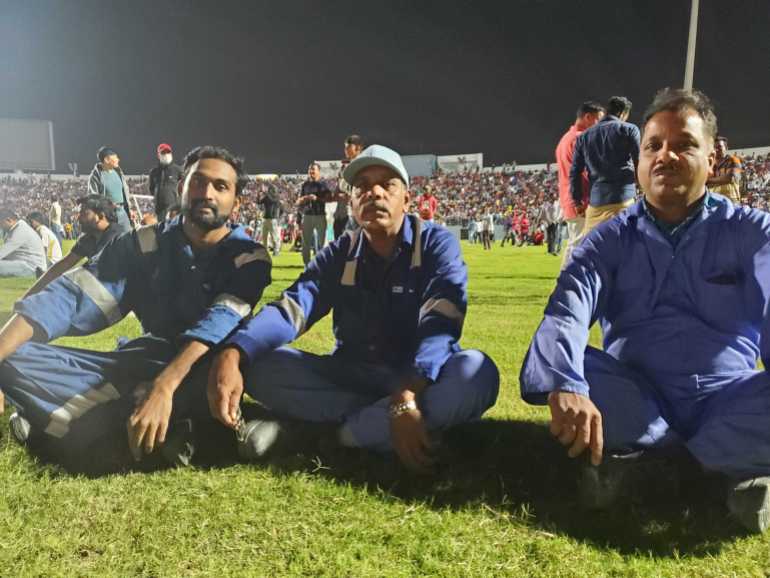Excitement filled the air as thousands of migrant workers showed up to watch the historic first game of the FIFA World Cup 2022 featuring Qatar and Ecuador at the Industrial Area Fan Zone in Qatar’s capital Doha.
Almost all male, the bustling crowds of largely South Asian workers from India, Bangladesh, Pakistan and Nepal, as well as some from Africa, had helped build the infrastructure that allowed the World Cup to take place.
On Sunday evening, they were more than ready to enjoy the game and appreciate the fruits of their labour.
Some arrived in their work overalls after coming straight from jobs. Others had the day off, and there were those who had asked employers if they could skip work to watch the match.
Though located about 30km (19 miles) southwest of central Doha and the official FIFA Fan Festival at Al Bidda Park, there was no less sense of anticipation among football fans in this industrial area where many of Qatar’s migrant labour population live.
“Here, I’m in the middle of it … and naturally thrilled,” 45-year-old Muhammad Hossein from Bangladesh told Al Jazeera at the fan zone in Doha’s Asian Town Cricket Stadium.
Hossein told how he had once worked on the construction of a Metro station in Doha — part of the many infrastructure projects for the World Cup — and that he was now employed there as a janitor.
Being part of the World Cup was a “big deal” personally and also, he said because it was the first time a Muslim country had hosted the tournament.
He never thought he would “be part of something this important in this country”, he said.
Though his home country is one of the world’s great cricket-playing nations, Hossein said he does not expect Bangladesh to replicate a similar success in international football, not any time soon, at least.
“My country has no chance in my lifetime … to qualify for the World Cup, or host it,” he said.

Qatar, which has a population of just some 2.8 million people, has become the first Middle Eastern and Muslim country to host the FIFA World Cup. Getting the country ready to hold the games was a herculean task — carried out mostly by overseas workers.
“Qatar did not have the Metro or the buses you see on the roads. All these buildings on Corniche, the highways and roads would maybe not exist if this giant event was not taking place,” Peter, a worker from India, told Al Jazeera.
“I am happy to say we [migrant workers] played a big role,” said the 48-year-old, who came to Qatar more than 15 years ago and works in an optical fibre-making company.
‘Properly enjoyed’ the match
Before kick-off, the atmosphere was vibrant as people poured into the fan zone, where the delicious aromas of biryanis cooked at food stalls filled the air.
But once the referee’s whistle blew, all attention was on the giant video screen and Qatar, who was undoubtedly the crowd favourite.
Every possession or counterattack by a Qatari player brought huge applause from the thousands of fans watching.
Unfortunately, Qatar fell short and was two goals down in the first half only, with the score ending 2-0 in favour of Ecuador.
Nevertheless, Pradeep from Mumbai, India, said he had “properly enjoyed” himself. The night would have ended better with a win for the hosts, of course, the 20-year-old said.
“We would have been celebrating on the streets,” he said.
Gates to the fan zone in this industrial area of Doha opened 20 to 30 minutes before the match. The fans cheered at the opening festivities, from Qatar’s Emir Sheikh Tamim bin Hamad Al Thani’s speech to Korean BTS superstar Jungkook’s performance.
Many captured the opening ceremony on their camera phones, which would be sent to loved ones overseas and from who many have long lived apart as they work in Qatar.
Music was also a part of the mix at the fan zone for workers where a DJ played many renowned Indian tracks, including Panjabi MC’s classic ‘Mundian to Bach Ke’ — a beat that was visibly enjoyed by the crowd.
Match tickets
Despite their delight at living in Qatar during the World Cup, nearly all those who spoke to Al Jazeera lamented the fact that most could not afford tickets to the actual games since their salaries were hardly more than 2,000 Qatari riyals ($550) per month.
Ticket prices are as high as 800 Qatari riyals ($220) for just the group games, while all knockout games are unavailable on the main buying or resale platform.
Peter, who works in the optical fibre company, said he had tried every few days to find the reported 40 Qatari-riyal ($11) match tickets, but he had given up the hunt believing that it was a waste of his time.
“Who will sell the cheap ones [tickets] now,” he asked.

Arvin Kumar, a work colleague who accompanied Peter to the fan zone game, had bought a ticket for the Netherlands vs Ecuador game which cost him 600 Qatari riyals ($165), despite just taking home a salary of 1,100 Qatari riyals ($302).
“I know it’s a lot,” Arvin told Al Jazeera.
“I have to save for myself and the family in India … that’s why I’m here after all,” he said.
“But when will I get this opportunity again to watch the biggest of all World Cups?”
Concerns about low wages, poor living conditions and worker safety issues in Qatar have been consistently raised by human rights groups and critics of the Gulf nation hosting the World Cup.
That criticism led to landmark reforms in 2020, including Qatar abolishing the so-called no-objection certificate, which had forced workers to seek consent from their current employers before being allowed to switch jobs. Qatar has also introduced a minimum monthly wage of 1,000 Qatari riyals ($275).
For Peter, setting aside tickets for the lower-paid migrants who helped build the infrastructure for the World Cup should have been considered.
People with large salaries had also availed of the cheaper tickets, he said.
A quota of tickets for the low-paid would have been a gesture welcomed by those who had made the games possible, he said.
“Preferably, FIFA and the government should have kept 10 per cent of the tickets for low-income workers.”


